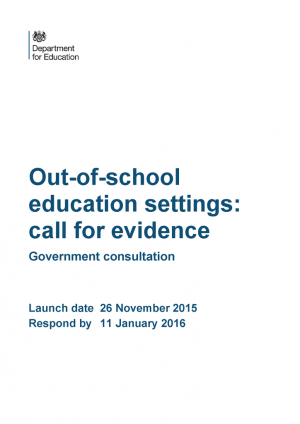
Following a commitment to crack down on harmful religious supplementary schools made by David Cameron earlier this year, the Government has now published its proposals for tightening the regulation of ‘out-of-school education settings’. The proposals, which form part of the Government’s wider Counter-Extremism Strategy and are targeted at schools which ‘promote intolerance’ and fail to encourage children to ‘respect those of other faiths and beliefs’, are now open for consultation until January. The British Humanist Association (BHA), which has alerted the Government to the plight of children in unregistered ‘faith’ schools on a number of occasions in the past, has welcomed the proposals and looks forward to taking a full part in the consultation.
Unsurprisingly, the focus of the consultation document is on the need to improve safeguards for children who are ‘vulnerable to the risk of extremism’ and ‘radicalisation’. However, the proposals also make clear that the current lack of a robust inspection and registration framework for out-of-school settings has resulted in children being educated in unacceptably ‘overcrowded, cramped and dirty conditions’, and subjected to a range of ‘unsuitable teaching material’.
The proposed key features of the new system include: a requirement on these settings to register so as to ensure greater transparency; improved inspection arrangements; and new powers to impose sanctions where the welfare of children is at risk, including barring individuals from working in schools and even closing premises.
The announcements follow a letter sent to the Education Secretary by Ofsted Chief Inspector Sir Michael Wilshaw earlier this month, who revealed that Ofsted inspections had discovered a number of schools, predominantly religious, that were unregistered and providing a worryingly narrow, scripture-based curriculum.
The BHA also met with officials from the Department for Education over the summer to draw their attention to this growing problem, particularly raising concerns about illegal yeshivas in London in which thousands of Charedi Jewish children are receiving an education largely designed to ensure that they remain isolated from wider society.
BHA Faith Schools and Education Campaigner, Jay Harman, said ‘It doesn’t matter if these “out-of-school education settings” are yeshivas, madrassas or fundamentalist Christian schools. If the supplementary education they provide encourages a lack of understanding and tolerance of those from backgrounds different to their own, this has to stop.
‘Of course, the Government must also recognise that in many cases these unregistered religious schools are not supplementary settings at all, but rather account for a child’s entire education. The children trapped in these kinds of institutions are being denied an education, denied a childhood, and denied the opportunity to engage and interact with the people with whom they share a society. Successive governments have known about this for far too long not to have acted, so we’re glad that something now seems to be being done. We will certainly respond to the call for evidence and will look to support the Government in any other way we can.’
Notes
For further comment or information, please contact BHA Faith Schools and Education Campaigner Jay Harman on jay@humanists.uk or 020 7324 3078.
Read the Government’s proposals in full: https://www.gov.uk/government/uploads/system/uploads/attachment_data/file/480133/out_of_school_education_settings_call_for_evidence.pdf
Read the BHA’s previous news item ‘BHA welcomes Prime Minister’s announcement of crackdown on religious supplementary schools’: https://humanists.uk/2015/10/08/bha-welcomes-prime-ministers-announcement-of-crackdown-on-religious-supplementary-schools/
Read Sir Michael Wilshaw’s letter to the Secretary of State for Education: https://www.gov.uk/government/publications/unregistered-schools-ofsted-advice-note
Read more about the BHA’s work on ‘faith’ schools: https://humanists.uk/campaigns/schools-and-education/faith-schools/
The British Humanist Association is the national charity working on behalf of non-religious people who seek to live ethical and fulfilling lives on the basis of reason and humanity. It promotes a secular state and equal treatment in law and policy of everyone, regardless of religion or belief.
